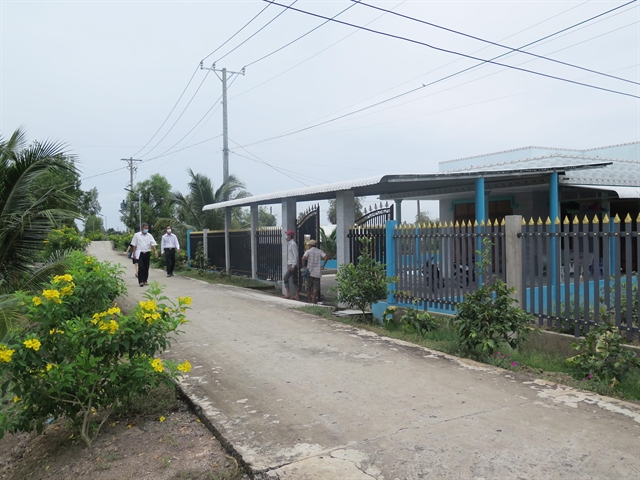 Society
Society

 |
| Tân Tây Commune in Long An Province’s Thạnh Hóa District has been recognised as a new-style rural commune. — VNA/VNS Photo Minh Hưng |
LONG AN — The Cửu Long (Mekong) Delta province of Long An is engaged in efforts to build new-style rural communes to improve the lives of people.
Nguyễn Minh Lâm, deputy chairman of its People’s Committee, said the province hopes to have nine more recognised as new-style rural communes this year, 12 others as advanced new-style rural communes and two as exemplary new-style rural communes.
Under the national programme on developing new-style rural areas, a new-style rural commune needs to meet 19 criteria related to planning, infrastructure, transport, irrigation, power supply, environment, income, education, healthcare, social security, culture, and others.
An advanced new-style rural commune must achieve higher standards across all 19 criteria, and recognition as exemplary entails even higher standards including having a 10 per cent higher per capita income.
To achieve the targets, the province will undertake advocacy activities to enhance awareness of the programme among officials and the public, roll out policies to implement the programme, improve its quality, and seek to efficiently implement the programme.
It will develop co-operatives, products under the country’s “One Commune - One Product” (OCOP) programme and rural tourism.
It will prioritise loans for agriculture and rural development, developing OCOP products and adopting technology for agricultural processing.
It will solicit the participation of individuals and economic entities in the programme for building new-style rural areas.
It had 118 of its 161 communes recognised as new-style rural communes as of last year, 28 of them achieving advanced status, according to its Department of Agriculture and Rural Development.
The programme has achieved great results, improving the looks of rural areas, establishing concentrated farming areas and increasing the use of advanced farming techniques.
In Vĩnh Hưng District, for instance, all commune roads are paved with asphalt or cement and the per capita income has reached VNĐ55 million (US$2,400).
Trần Văn Cường, chairman of its People’s Committee, said building new-style rural areas has ensured social security and safety in rural areas and made rural areas more beautiful and greener and cleaner.
Nguyễn Văn Lượm, a resident in Vĩnh Hưng’s Tuyên Bình Tây Commune, said after the programme began, his locality has improved significantly.
“Roads are paved with asphalt or cement, facilitating transport. Local people are helped with their livelihoods, which also helps develop the economy.”
The province has developed 77 OCOP products, including 26 rated four-star and 51 with three stars.
The ratings are between one and five stars.
Most of the OCOP products are foods, souvenirs, herbal medicinal products, furniture, or agricultural products.
The province has 295 co-operatives with average annual revenues of VNĐ1.6 billion ($67,600) and profits of VNĐ150 million ($6,300), according to its Co-operative Alliance.
Their members earn an average income of VNĐ4.5 million ($190) a month.
Digital transformation
The province People’s Committee has begun a programme for digital transformation to achieve smart rural development and narrow the gap in service quality between rural and urban areas.
It plans to train officials managing the programme of new-style rural communes in digital transformation and have at least 90 per cent of provincial-, 80 per cent of district- and 60 per cent of commune-level public documents processed online.
It also aims to have 50 per cent of districts linking agricultural stakeholders and applying digital technology, at least 40 per cent of communes and districts to providing at least one essential public service such as healthcare, education, security, environment, and culture online.
Each district, town and city will soon trial at least one smart rural commune in fields in which they have advantages such as economy, rural tourism, environment, and culture. — VNS




